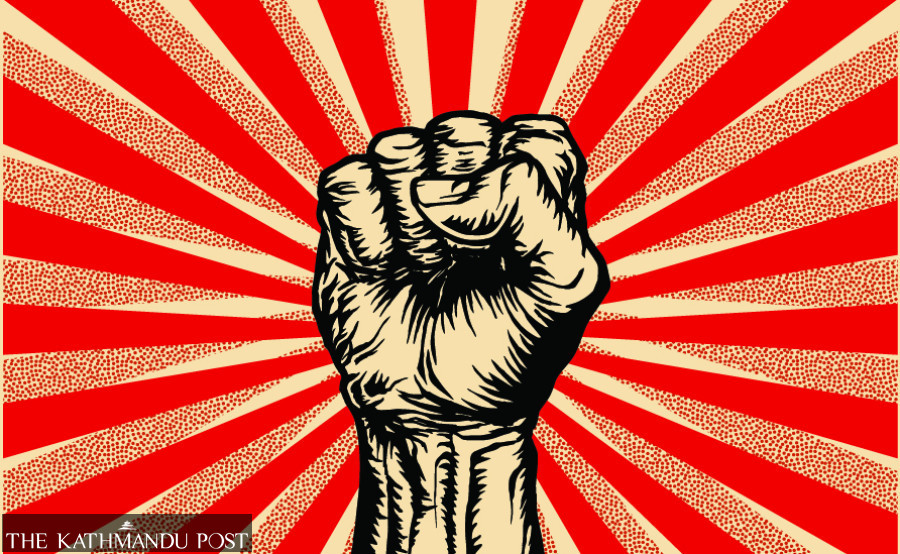Columns
Nepal’s socialism: The biggest scam
If socialism was ever meant to empower people, Nepal’s version has done the opposite.
Prashant Singh
In the long catalogue of political deceptions Nepal has endured, nothing comes close to the magnitude of the socialist consensus—a deception so total, so sacred, that questioning it invites moral outrage. When one raises even the mildest critique of the socialist model, one is met with looks of disbelief. “What do you mean not socialism?” they ask, as though it’s the only ethical path ever available to a decent society.
Every single political party in Nepal—from the ultra-left Maoists to Rastriya Swatantra Party—unapologetically declares itself socialist. The Maoists want socialism through revolution; the CPN (UML) wants it through governance; the Congress wants it through the middle path; even the dozens of fringe parties marching behind identity banners see socialism as their holy grail. It is not merely ideological laziness. It’s a hegemonic, unthinking consensus, where all critique is taboo.
So much so that when Nepal’s current constitution was drafted in 2015, it went beyond merely mentioning socialism. It enshrined it as the destination of the state itself. Today, the preamble pledges the nation to achieving socialism. And yet, amid all the critiques of the constitution—from federal structure to secularism to provincial boundaries—no major voice dares question the one clause that may be doing the most damage: the constitutional endorsement of socialism itself.
But how did we get here? How did Nepal’s people come to see socialism not just as an option but as a non-negotiable ideal?
As someone who has driven over 80,000 kilometres across the nook and corner of Nepal in the past five years, I have spoken with hundreds of villagers, especially from the hills and the indigenous ethnic belts. There is a reason why socialism resonates with them. Their historical ethos has always been “community-first.” The harsh mountain ecology, the history of external threats, and the reality of interdependence have instilled in them a deep reverence for collective values over individual ambition. When they hear socialism promises to put “society first,” it feels like a natural extension of their lived culture.
But here lies the betrayal. Nepal’s dominant socialist parties—Maoists, UML, Congress—have never sought to empower ‘communities’. Instead, they have become obsessed with empowering the ‘party’. The party, and only the party, is seen as the true instrument of revolution, development and governance. In fact, Nepal’s political leaders have consistently treated the ‘community-based’ ethos as a threat—too outdated, too rooted in local wisdom. And there lies the sad irony.
In practice, every one of these socialist leaders is individually driven, not community-minded. From Pushpa Kamal Dahal to KP Oli, from Sher Bahadur Deuba to Baburam Bhattarai, from Upendra Yadav and CK Raut to Rabi Lamichhane and Resham Chaudhary—they are all individualists masquerading as collectivists. They control their parties like private properties, appoint loyalists, suppress dissent, and use socialist language to mask deeply self-serving ambitions. If socialism was meant to dismantle elitism and hierarchy, Nepal’s version has entrenched it.
The second group duped by this grand scam is Nepal’s urban middle class, particularly those who hope for a better life through education, healthcare and stable employment. They are constantly told that capitalism is greedy and socialism is kind. That socialism will give them “free” services and cradle-to-grave welfare. But look around. What does Nepal’s socialist state actually deliver?
Public education? Failing and hollowed out. Public healthcare? A bureaucratic maze of inefficiency. Pensions? Reserved for public employees and politicians. Corruption? Institutionalised at every level.
The Nepali middle class is sold a dream of “Nordic socialism” and handed the nightmare of Soviet-era bureaucracy minus the discipline. The political class loves to shout about crony capitalism, but they are the biggest cronies in town. They never use the term “free market economy”, as if private initiative is somehow immoral.
And then there is the third victim of Nepal’s socialist confusion: the international community. Nepal’s constitution vows to “achieve socialism through democratic means.” In diplomatic terms, this signals a future where nationalisation, state control over production, and suppression of markets are not only possible but constitutionally mandated. Yet in private meetings, Nepali politicians, especially the self-declared communists, assure diplomats, multilateral agencies and foreign investors that “socialism is just a formality.” They point to the vibrant private sector and claim Nepal is a “de facto market economy.”
But no serious international investor trusts such double-speak. No Microsoft, no Samsung, no Toyota, no Tata is going to enter an economy that constitutionally reserves the right to one day become fully socialist. This creates a policy paradox: Capital is welcomed but never trusted, and investors are invited but never protected. What kind of investor comes into such an environment? Not the ones looking to build long-term prosperity, but the ones ready to grease the palms of corrupt officials and extract short-term profits—exactly the kind of FDI Nepal is currently seeing.
So yes, Nepal’s socialism is not just an ideology, it is the largest national scam of our time. One that cheats rural and ethnic communities by promising community empowerment while dismantling it in practice; cheats the middle class by promising cradle-to-grave social protection and delivering only decay and inefficiency, and cheats international investors by saying one thing constitutionally and doing another informally, creating distrust and deterring serious capital.
It is time—past time—to call this bluff. To declare that Nepal’s socialism is not a sacred principle but a political cover story, a rhetorical smokescreen that hides incompetence, corruption and statism. We need a new political language that respects freedom, fosters real communities, supports responsible capitalism and tells the truth. If socialism was ever meant to empower people, Nepal’s version has done the opposite. And if we do not dismantle this delusion soon, we will be remembered for letting the greatest political fraud in our modern history go unchallenged.




 11.12°C Kathmandu
11.12°C Kathmandu















